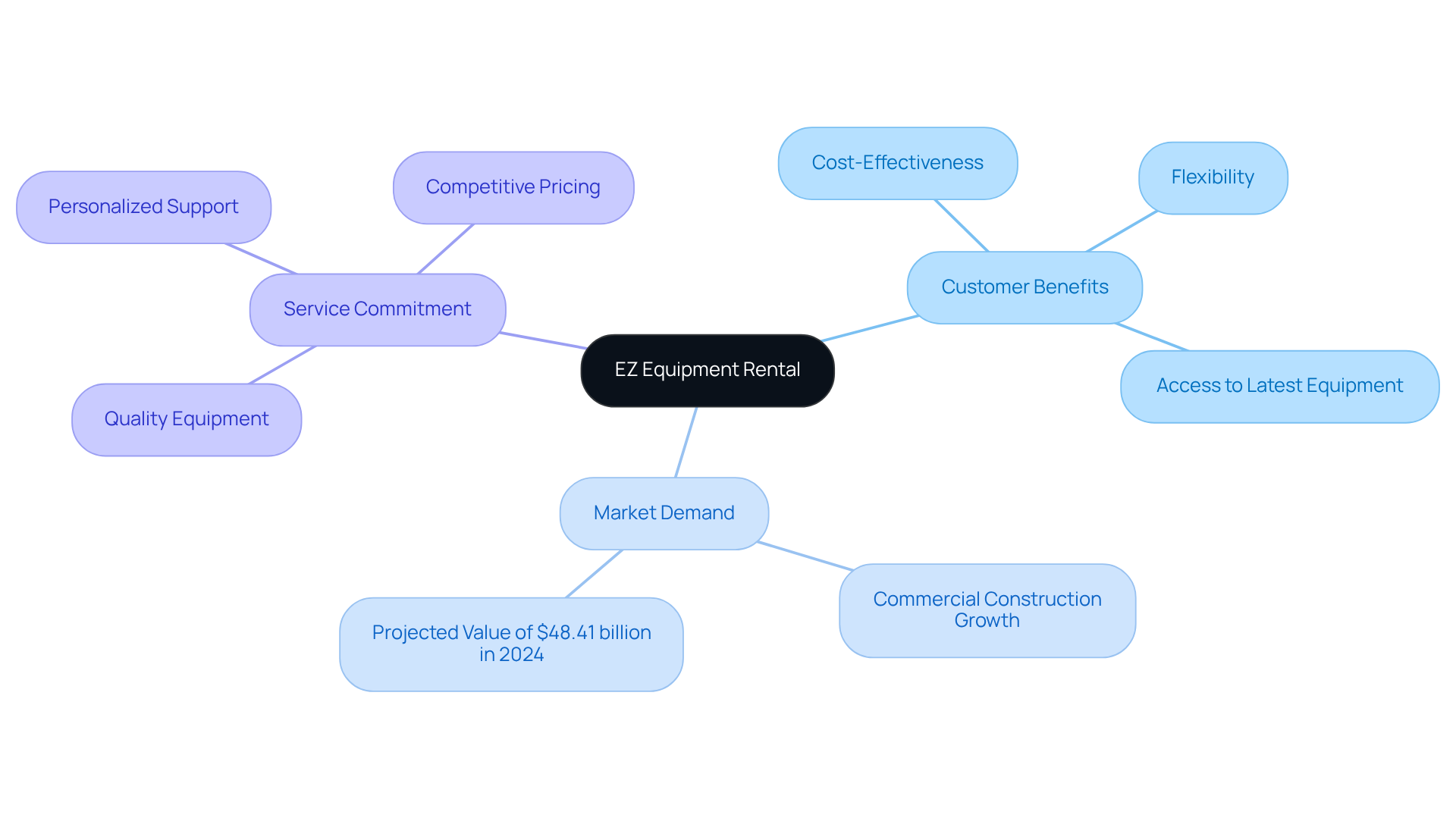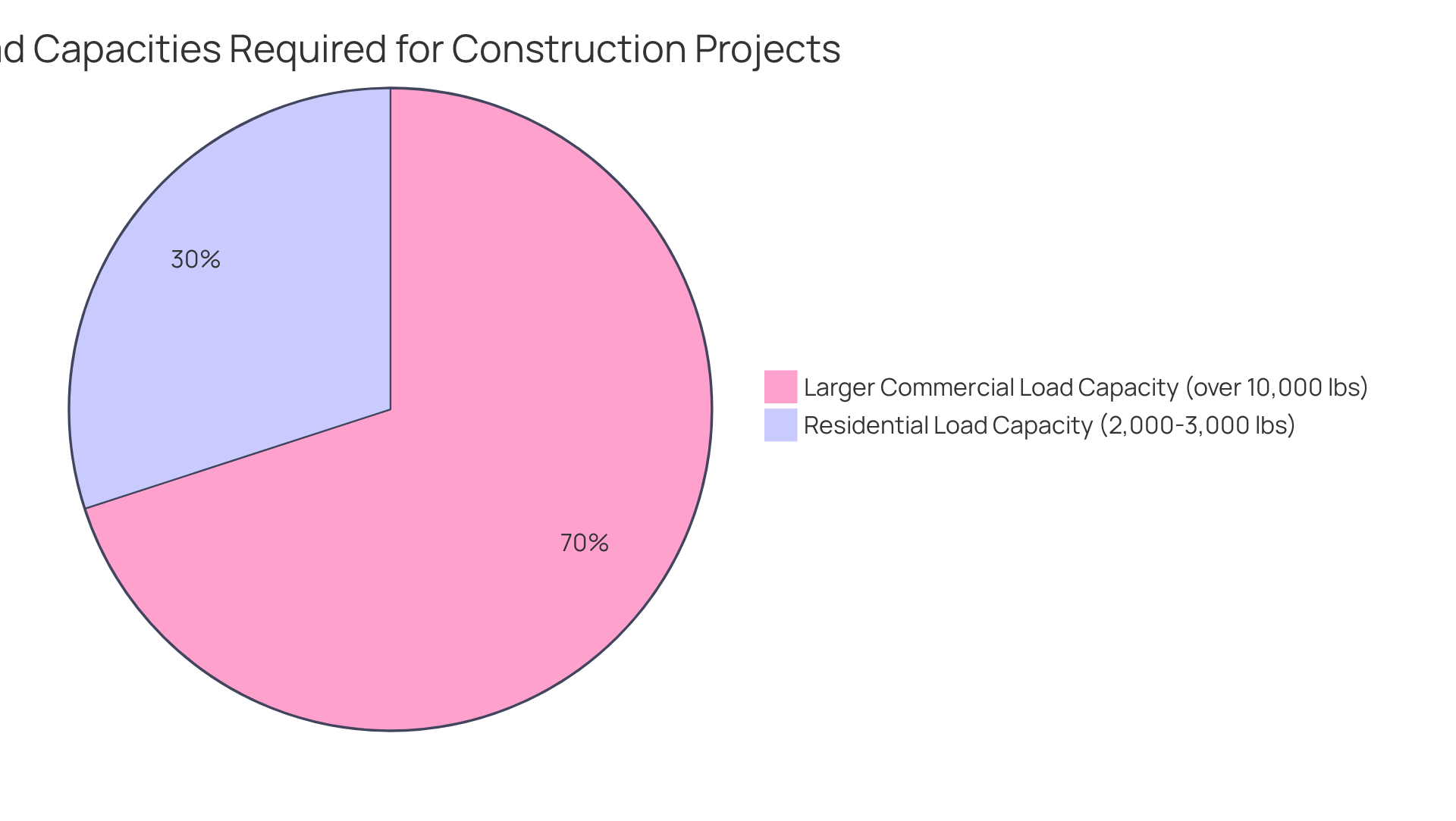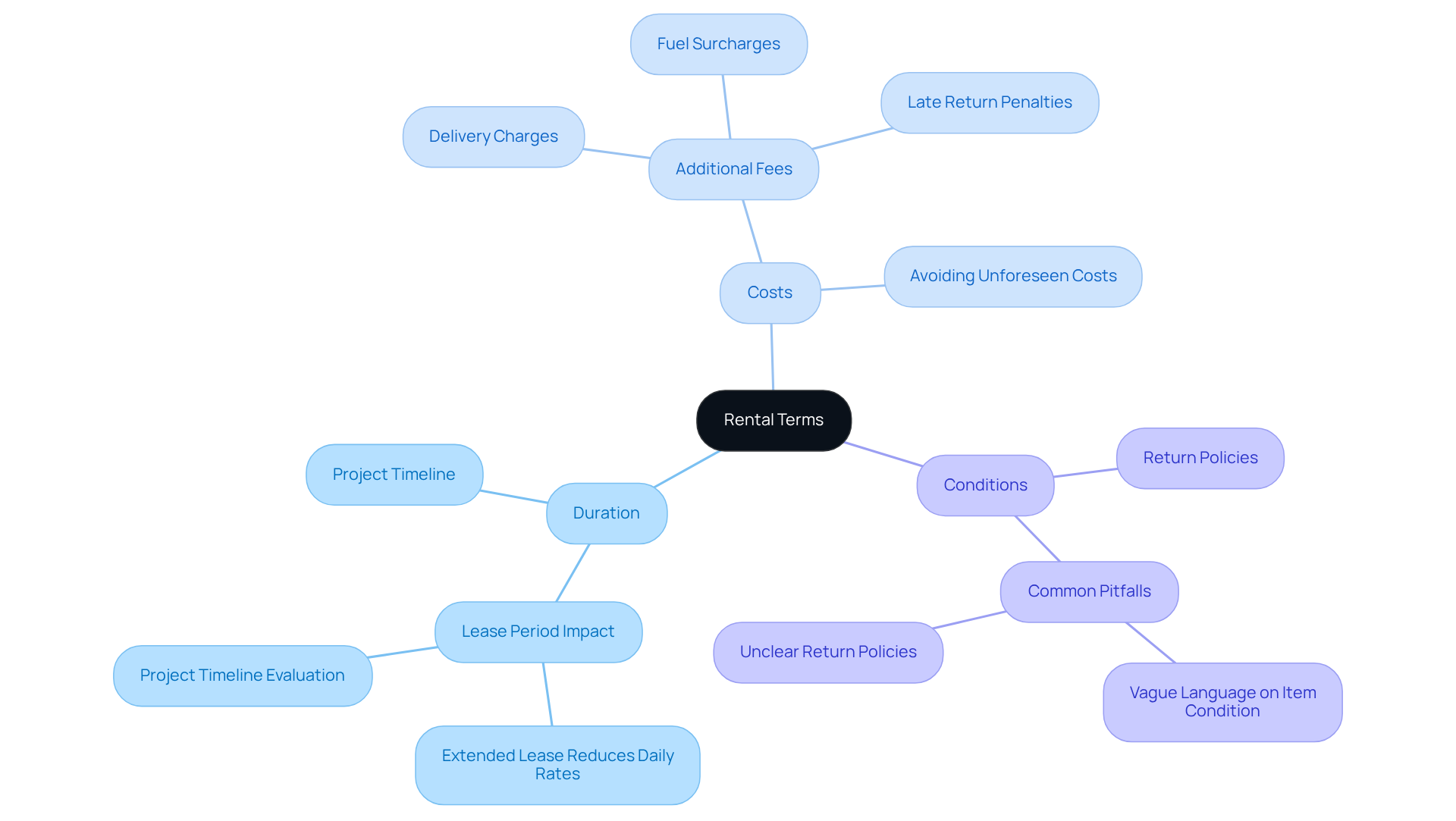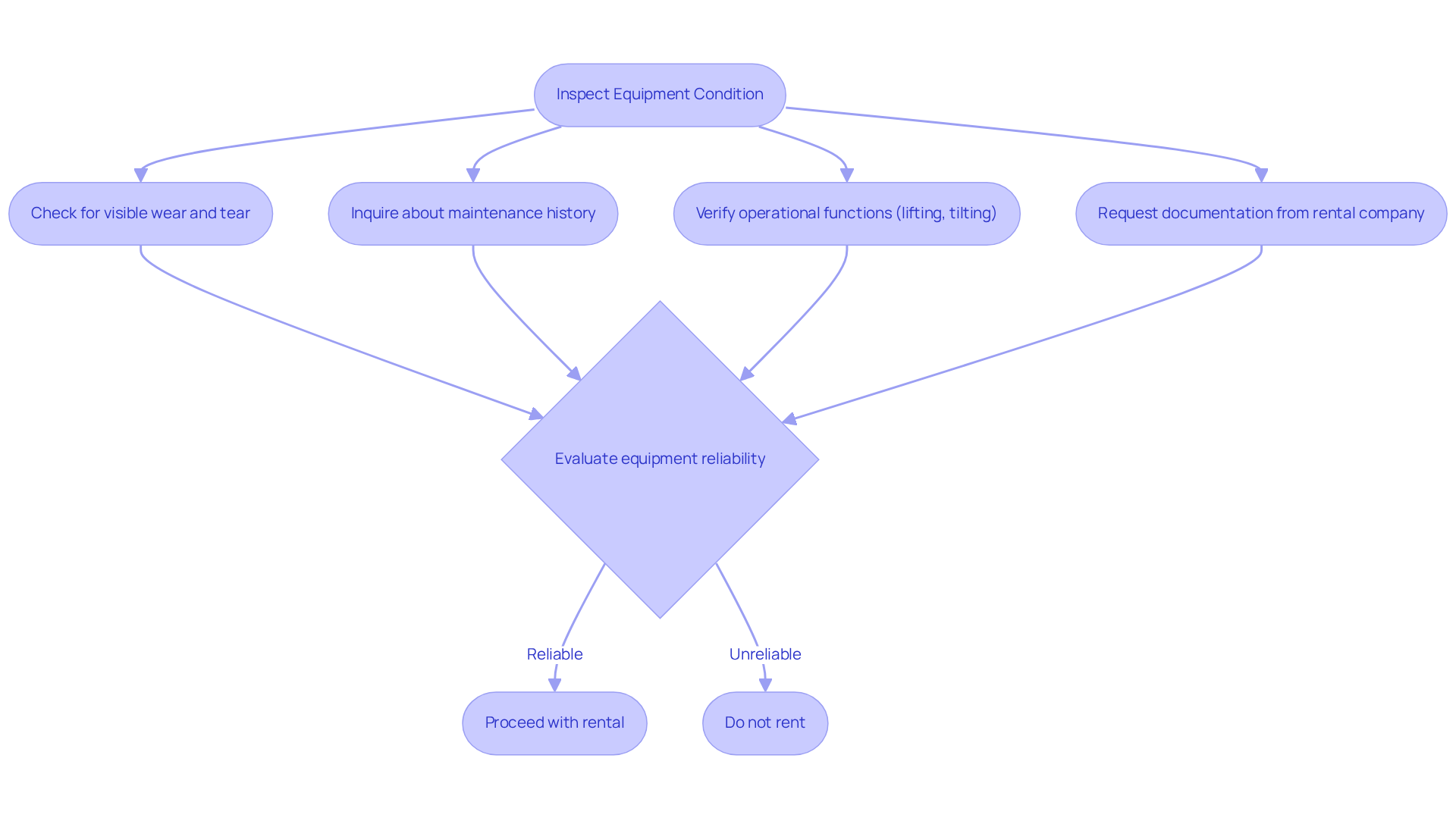Overview
The article outlines crucial strategies for renting a front end loader, highlighting the necessity of:
- Evaluating load capacity
- Comprehending rental terms
- Confirming operator training
- Ensuring equipment reliability
These insights are particularly relevant in today's landscape, where the demand for commercial construction is escalating. The need for cost-effective and adaptable solutions is paramount, as they significantly contribute to project efficiency and safety.
In addition, assessing load capacity ensures that the equipment can handle the specific demands of your project, thereby minimizing the risk of operational failures. Understanding rental terms is equally vital; it allows you to navigate agreements confidently and avoid unexpected costs. Furthermore, ensuring that operators are adequately trained and that the equipment is reliable not only enhances safety but also boosts overall productivity.
As the commercial construction sector continues to evolve, these recommendations become increasingly important. By prioritizing these factors, you position yourself to make informed decisions that lead to successful project outcomes. Engage with us today to explore our range of front end loaders and experience the quality and reliability that can elevate your projects.
Key Highlights:
- EZ Equipment Rental is a leading provider of front end loaders for rent in the Dallas-Fort Worth area, emphasising quality and customer satisfaction.
- The demand for front end loaders is increasing due to growth in commercial construction, projected to reach $48.41 billion in 2024.
- Renting offers cost-effectiveness and flexibility, allowing contractors to access modern equipment without maintenance burdens.
- Assessing load capacity is crucial; residential projects may need loaders with capacities of 2,000-3,000 pounds, while commercial projects may require over 10,000 pounds.
- Understanding rental terms, including duration and potential fees, is essential to avoid unexpected costs.
- Inspecting equipment condition and reviewing maintenance history can prevent costly delays and ensure reliability.
- Operator training and certification are necessary for safe equipment use, reducing the risk of accidents significantly.
- Researching rental company reputation through customer reviews can lead to better project outcomes.
- Key specifications for loaders include bucket size, lift height, and fuel efficiency, impacting project success.
- Comparing rental prices helps secure the best deal, balancing cost with quality and service.
- Flexible rental agreements allow for adjustments based on changing project needs, enhancing operational efficiency.
- Additional services like delivery and support are vital for minimising downtime and ensuring project success.
Introduction
Navigating the complexities of renting a front end loader can be daunting, particularly in light of the construction industry's rapid growth and evolving demands. Understanding the nuances of equipment rental streamlines project execution and maximizes both efficiency and cost-effectiveness. However, with a multitude of providers and rental terms available, how can one ensure they are making the best choice for their specific needs? This article explores nine essential tips designed to empower contractors and project managers to confidently select the right front end loader and optimize their rental experience.
EZ Equipment Rental: Premier Choice for Front End Loader Rentals in Dallas-Fort Worth
EZ Equipment Rental stands as the premier provider of front end loader for rent in the Dallas-Fort Worth area. Our unwavering commitment to quality and customer satisfaction is evident in our extensive selection of well-maintained equipment, designed to cater to a variety of project needs. With our knowledgeable team at your service, customers can expect personalized support that ensures the selection of the right tools for their specific tasks, optimizing the rental process for maximum efficiency.
The demand for front end machinery is particularly robust in the region, driven by the ongoing growth in commercial construction, projected to reach a value of $48.41 billion in 2024. Leasing a front end loader for rent offers numerous advantages, including cost-effectiveness and flexibility, especially for short-term projects where purchasing machinery may not be feasible. This strategy enables contractors to allocate their resources more effectively while gaining access to the latest equipment without the burden of maintenance costs.
EZ Equipment Rental's presence in Irving, TX, is strengthened by our dedication to customer satisfaction and reliability, positioning us as a preferred choice among local construction project managers. Our commitment to providing high-quality equipment and exceptional service, along with competitive pricing and flexible leasing options, establishes us as a key player in the competitive Dallas-Fort Worth equipment leasing market. Contact us today to discover more about our rental offerings!

Evaluate Load Capacity: Ensure the Front End Loader Meets Project Requirements
When hiring a front end machine from EZ Equipment Rental, assessing the load capacity required for your specific task is crucial. Different models provide varying lifting capabilities, making it vital to choose one that can efficiently handle the weight of the materials involved.
For example, projects involving substantial materials such as gravel or concrete necessitate machinery with robust specifications to avoid operational delays and safety hazards. Industry experts emphasize that selecting the appropriate equipment not only enhances productivity but also ensures compliance with safety regulations.
In fact, many construction projects have specific load capacity requirements:
- A residential site may need a compact loader with a capacity of approximately 2,000 to 3,000 pounds.
- Larger commercial endeavors might require loaders capable of lifting over 10,000 pounds.
Understanding these requirements can significantly influence project timelines and overall success.

Understand Rental Terms: Clarify Duration, Costs, and Conditions Before Renting
Before concluding your lease, it is essential to thoroughly examine the leasing terms. Begin by clarifying the length of the leasing period, as this can significantly impact your expenses. Extended lease periods often lead to reduced average daily rates, making it crucial to evaluate your project's timeline accurately. Additionally, inquire about any associated costs, including common additional fees such as delivery charges, fuel surcharges, and late return penalties. Understanding these potential fees can help you avoid unforeseen costs that may arise during the leasing period.
Furthermore, clear communication with the leasing company is vital. Discuss the terms for returning the items, including any penalties for late returns, to ensure you are fully aware of your responsibilities. As B. Heath Witzen from the Consumer Financial Protection Bureau emphasizes, clarity in the terms and conditions of leasing agreements fosters trust between parties. Moreover, be cautious of typical pitfalls in leasing contracts, such as vague language regarding item condition and unclear return policies. By taking these steps, you can secure the equipment you need while minimizing the risk of unexpected charges and ensuring a smooth rental experience.

Inspect Equipment Condition: Verify Maintenance History and Functionality
Before renting a front end loader for rent, it is essential to conduct a thorough inspection. Look for visible signs of wear and tear, and importantly, inquire about the machine's maintenance history. A machine that has been well-maintained is significantly less likely to experience breakdowns, which can lead to costly delays in your project timeline. Regular maintenance not only prolongs the lifespan of the equipment but also enhances its operational efficiency. For example, a machine that has undergone consistent preventive maintenance can last between 10,000 to 20,000 hours of operation, with some exceeding 20,000 hours when properly cared for. Ensure that all functions, such as lifting and tilting, operate smoothly to guarantee optimal performance throughout your usage period.
Furthermore, reviewing maintenance history can uncover previous problems and repairs, offering insight into the machine's reliability. Keep in mind that an hour of equipment downtime costs companies an average of $260,000, making it essential to confirm the equipment's maintenance before making a leasing decision. As maintenance expert Carsten Mahaini states, "Without a system, everything is manual. And manual means Excel spreadsheets and a lot of work managing assets." To verify the maintenance history of a front end loader for rent, request documentation from the rental company that details past maintenance records, inspections, and any repairs conducted. This information can assist you in evaluating the equipment's reliability and performance potential.

Confirm Operator Training: Ensure Proper Certification for Safe Equipment Use
Before operating a front end loader for rent, it is essential to verify that the operator has undergone comprehensive training and holds the necessary certification. This step is vital for ensuring safe operation and adherence to industry regulations. OSHA mandates that all forklift operators must be trained and certified before use, underscoring the legal necessity of certification.
Certified operators are well-versed in the equipment's controls and safety features, significantly mitigating the risk of accidents and enhancing overall productivity on the job site. In fact, studies indicate that proper training can reduce forklift accidents by up to 70%, highlighting the direct impact of certification on safety outcomes.
Furthermore, organizations that emphasize safety training frequently observe a return on investment, with profits rising by 4 to 7% for each initiative when they dedicate resources to safety efforts. The construction industry, known for its high accident rates, with construction workers accounting for approximately 20% of all workplace fatalities in the United States in 2023, underscores the necessity of certified operators, as inadequate operator training increases the likelihood of accidents.
By ensuring that operators are certified, companies not only adhere to OSHA regulations but also promote a safer work environment, ultimately resulting in more effective task execution.

Research Rental Company Reputation: Choose a Trusted Provider for Your Needs
Thorough research into the reputation of your rental company is crucial. Customer reviews and testimonials act as invaluable indicators of reliability and service quality. EZ Equipment Rental stands out in Dallas for several compelling reasons, including its commitment to providing well-maintained tools and attentive assistance—both essential elements for the success of your project.
Construction managers consistently emphasize the importance of selecting suppliers with a solid reputation, as this choice can significantly impact timelines and outcomes. For instance, a supervisor noted that opting for a dependable leasing provider like EZ Equipment Rental not only ensures access to high-quality tools but also fosters a more efficient operational process.
In an industry where equipment performance can dictate the success or failure of a project, prioritizing a leasing company with a proven track record of customer satisfaction is a strategic move. Furthermore, EZ Equipment Rental offers competitive pricing and flexible rental terms, further enhancing the likelihood of your project's success.

Assess Loader Features: Identify Necessary Specifications for Your Project
When selecting a front end machine, it is crucial to evaluate characteristics that align with the specific needs of your project. Key specifications to consider include:
- Bucket size
- Lift height
- Fuel efficiency
For instance, the Volvo L150H model showcases an impressive 35% greater fuel efficiency and 28% reduced fuel consumption compared to its competitors, establishing it as an exceptional choice for cost-effective initiatives. A case study analyzing fuel efficiency in front end wheel machines further corroborates this, revealing significant potential savings in operating costs for users.
Moreover, assess whether your project requires particular attachments or capabilities. If maneuverability in confined spaces is essential, opt for a machine engineered for enhanced agility. Conversely, for tasks demanding heavy lifting, prioritize models that offer superior power and stability. As construction specialist Deirdre Pearson emphasizes, understanding these specifications is vital for aligning the machine's capabilities with your requirements, which can profoundly impact your project's success and efficiency.
EZ Equipment Rental, a leading supplier in the DFW region, offers a diverse range of front end loaders for rent, along with competitive pricing and flexible terms. This makes it an invaluable resource for construction project managers aiming to optimize their machinery selections.

Compare Rental Prices: Find the Best Value for Your Front End Loader Rental
When looking for a front end loader for rent, it is essential to compare prices across various rental companies to secure the best deal. While competitive rates are important, the quality of the equipment and the level of customer service should also be key considerations. Opting for a slightly higher cost from a reputable supplier can ultimately save you money by minimizing the risk of malfunction and potential delays in your work.
For example, the average daily rental cost for a wheel loader in Dallas is approximately $762, although prices can vary significantly based on the company and specific model, with some rentals reaching an average daily price of $1,039. Furthermore, a cost-benefit assessment indicates that investing in higher-quality tools often leads to improved performance and fewer maintenance issues, which can be particularly advantageous in large-scale projects.
Financial advisors frequently highlight that the value derived from reliable equipment can outweigh the initial cost, making it a prudent investment in the long run. By taking the time to evaluate both cost and quality, you can ensure that your choice aligns with your needs and budget.

Seek Flexible Rental Agreements: Adapt to Changing Project Requirements
When looking for a front end loader for rent, it is essential to seek adaptable agreements with EZ Equipment Rental that allow for modifications based on your project's evolving requirements. The scalability of leasing enables you to easily adjust your agreement, facilitating a response to changing demands without the constraints of ownership. This flexibility may include options for:
- Extending the lease duration
- Altering the type of equipment as your project needs shift
Such adaptability not only helps you manage costs effectively but also ensures that you have the right equipment available precisely when you need it.
Explore Additional Services: Consider Delivery and Support Options for Your Rental
When leasing a front end loader for rent, it is essential to consider the additional services offered by EZ Equipment Rental. These include:
- Delivery to your job site
- Setup assistance
- Ongoing support throughout the lease period
Such services not only streamline operations but also ensure that you have the necessary resources to complete your project efficiently. For example, timely delivery significantly reduces downtime, allowing your team to commence work immediately upon arrival. Furthermore, having a knowledgeable support team available addresses any issues that arise, thereby enhancing overall productivity.
The scalability of renting from EZ Rental Solutions allows you to effortlessly modify your rental agreement as your business expands or operational requirements shift, particularly regarding specific types of machinery such as forklifts. This flexibility is invaluable for adapting to fluctuating demand without the constraints of ownership. Industry leaders emphasize the importance of these services. A case study highlighted how a healthcare facility managed a sudden influx of patients by renting equipment and utilizing delivery services, enabling them to respond quickly without the financial burden of purchasing new devices. This flexibility is equally essential in construction, where timelines can be tight and unforeseen challenges may occur.
Additionally, customer satisfaction often hinges on the quality of support received. Companies that provide comprehensive delivery and setup services tend to see higher levels of customer loyalty and referrals. As highlighted by industry specialists, incorporating customer support throughout all processes results in a more unified and efficient leasing experience. By prioritizing these extra services, you can ensure that your equipment lease not only meets your immediate needs but also contributes to the overall success of your endeavor. Consider reaching out to EZ Equipment Rental today to discuss how we can support your next project with our front end loader for rent and flexible rental options.
Conclusion
Navigating the rental landscape for front end loaders is crucial for ensuring project success in the dynamic construction industry. By comprehensively understanding the key factors involved in the rental process, contractors and project managers can make informed decisions that significantly enhance efficiency and cost-effectiveness.
This article has outlined nine critical tips for renting a front end loader. These include:
- Evaluating load capacity
- Understanding rental terms
- Inspecting equipment condition
- Confirming operator training
- Researching rental company reputation
Each of these elements is vital in securing the right machinery tailored to specific project needs, all while minimizing potential risks and costs.
Prioritizing these considerations streamlines the rental process and contributes to the overall success of construction projects. As the demand for reliable equipment continues to rise, embracing the insights provided here empowers contractors to select the best rental solutions available. This ensures they are well-equipped to tackle any challenges that may arise. To explore how trusted providers like EZ Equipment Rental can support your next project with quality equipment and exceptional service, reach out today.
Frequently Asked Questions
What is EZ Equipment Rental known for in the Dallas-Fort Worth area?
EZ Equipment Rental is recognized as the premier provider of front end loader rentals, offering a wide selection of well-maintained equipment and personalized support to cater to various project needs.
Why is there a high demand for front end loaders in the Dallas-Fort Worth region?
The demand for front end loaders is driven by the ongoing growth in commercial construction, which is projected to reach a value of $48.41 billion in 2024.
What are the benefits of leasing a front end loader instead of purchasing one?
Leasing a front end loader is cost-effective and flexible, especially for short-term projects, allowing contractors to allocate resources more efficiently while accessing the latest equipment without maintenance costs.
How can customers ensure they select the right front end loader for their project?
Customers should assess the load capacity required for their specific task, as different models have varying lifting capabilities. It's crucial to choose a loader that can efficiently handle the weight of the materials involved.
What load capacity is typically needed for different types of construction projects?
A residential site may require a compact loader with a capacity of approximately 2,000 to 3,000 pounds, while larger commercial projects might need loaders capable of lifting over 10,000 pounds.
What should customers clarify before finalizing a rental agreement?
Customers should clarify the length of the leasing period, associated costs (like delivery charges and late return penalties), and the terms for returning the equipment to avoid unforeseen expenses.
Why is clear communication important when renting equipment?
Clear communication fosters trust between the leasing company and the customer, helping to ensure that both parties understand the terms and conditions, which minimizes the risk of unexpected charges and ensures a smooth rental experience.




